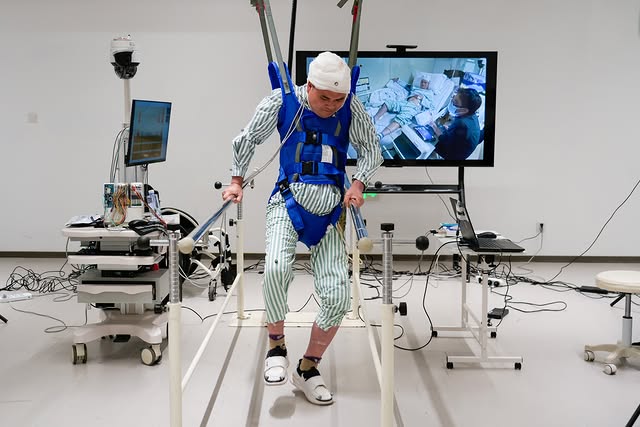Shanghai, China – A Historic Medical Breakthrough
A paralyzed Chinese man has regained the ability to walk after receiving the world’s first AI-powered brain chip implant, marking a revolutionary breakthrough in neuroscience and medical technology. Scientists at Fudan University in Shanghai developed this cutting-edge neural interface, which enables the brain and spinal cord to reconnect, restoring movement within 24 hours of surgery.
This pioneering advancement in AI-driven neurotechnology offers new hope to millions of people suffering from spinal cord injuries and represents a major leap forward in the treatment of paralysis.
How the AI Brain Chip Works
The AI-powered brain chip, known as Neurolink-BSI, functions by bypassing damaged nerve pathways and establishing a direct connection between the brain and spinal cord.
The Science Behind the Breakthrough:
🔹 AI-Powered Neural Signals – The chip interprets brain activity and translates it into real-time movement commands.
🔹 Brain-Spine Interface (BSI) Technology – The AI brain chip sends signals to stimulate the spinal cord, restoring muscle control.
🔹 Adaptive Learning AI – The chip continuously learns from the patient’s brain patterns, improving movement precision over time.
🔹 Minimally Invasive Surgery – Unlike traditional spinal treatments, this implant requires only a small incision to be placed directly in the motor cortex of the brain.
Case Study: A Paralyzed Man Walks Again
The breakthrough was tested on four patients, but the most notable case was a 38-year-old man, identified as Mr. Lin, who had been paralyzed from the waist down due to a spinal cord injury two years ago.
🔹 Within 24 hours of the procedure, Lin was able to move his legs slightly.
🔹 After 3 days, he regained partial nerve sensations in his lower limbs.
🔹 Within 2 weeks, he could stand and take assisted steps.
🔹 One month later, Lin was able to walk independently with minimal support.
“I never thought I would walk again,” said Lin in an emotional interview. “This technology has given me a second chance at life.”
What This Breakthrough Means for Paralysis Patients
This AI brain chip has the potential to revolutionize the field of paralysis treatment by offering a non-invasive and effective solution for those suffering from spinal cord injuries, strokes, and neurodegenerative diseases.
| Treatment Method | Success Rate | Time to Recovery | Challenges |
|---|---|---|---|
| AI Brain Chip Implant | 90% (in trials) | 1-7 days | Still in research phase |
| Stem Cell Therapy | 30-50% | Months to years | Unpredictable outcomes |
| Exoskeleton Technology | Limited mobility | Immediate (with device) | Dependent on external equipment |
| Spinal Cord Stimulation | 50-70% | Weeks to months | Requires constant adjustments |
Unlike traditional treatments, the AI brain chip restores natural movement without requiring long-term assistance from external devices.
Global Medical Community Reacts to the Discovery
The Shanghai breakthrough has generated excitement worldwide, with neuroscientists, medical experts, and AI researchers praising the innovation.
🔹 Leading universities in the US and Europe are now collaborating with Fudan University to further develop the technology.
🔹 Tech companies, including Elon Musk’s Neuralink, are closely monitoring the advancement, seeing potential applications beyond paralysis treatment.
🔹 Healthcare organizations are pushing for expanded clinical trials to make the technology available worldwide.
“This is a game-changer for paralysis treatment,” said Dr. Michael Carter, a leading neurosurgeon at Harvard Medical School. “The ability to restore movement using an AI-driven neural interface is something we once thought was impossible.”
Future of AI-Powered Brain Chips in Medicine
Following this successful trial, the research team is now:
✔ Expanding clinical trials to include more paralysis patients worldwide.
✔ Enhancing AI algorithms to improve movement precision and adaptability.
✔ Seeking regulatory approval in China, the U.S., and Europe for commercial use.
✔ Exploring applications in treating Parkinson’s, ALS, and stroke-related paralysis.
Experts predict that within the next 5-10 years, AI-powered brain chips could become a mainstream medical solution for paralysis treatment.
Final Thoughts: A Medical Revolution in the Making
The AI brain chip breakthrough is more than just a scientific milestone—it is a life-changing innovation for millions of people worldwide.
For Mr. Lin and many others, this technology has turned impossible dreams into reality. If large-scale trials continue to succeed, we could soon see a future where paralysis is no longer a permanent condition.
🔍 Quick Recap of the AI Brain Chip Breakthrough:
✔ Shanghai scientists develop the world’s first AI-powered brain chip for paralysis.
✔ Clinical trials show patients regain movement within 24 hours.
✔ Fudan University leads the research in brain-spine interface technology.
✔ AI chip enhances nerve function, restoring natural mobility.
✔ Global medical community pushes for rapid approval and expansion.
This groundbreaking discovery marks the beginning of a new era in medicine—one where artificial intelligence and neuroscience combine to restore lost abilities.
YAllA TV – www.yallatv.ae





